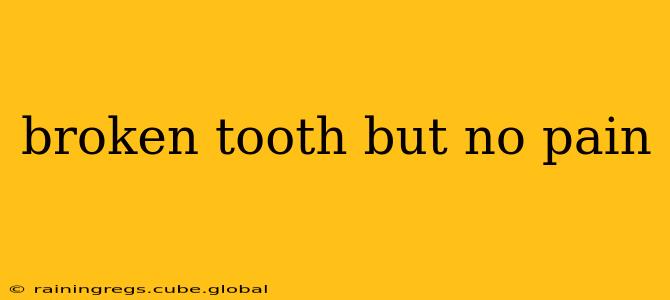A broken tooth, even without pain, requires immediate attention. Ignoring it can lead to significant dental problems down the line, including infection, nerve damage, and further tooth fracture. This comprehensive guide will walk you through the potential causes, necessary steps, and long-term implications of a broken tooth, even if it's currently pain-free.
What Causes a Broken Tooth Without Pain?
Several factors can contribute to a broken tooth without immediate pain. The extent of the fracture and the location of the break play a significant role. A small chip on the enamel, for instance, might not initially cause pain because it hasn't reached the sensitive dentin or pulp (the tooth's inner core containing nerves and blood vessels). However, even small cracks can expand over time, leading to pain and more severe problems.
Other potential causes include:
- Bruxism (teeth grinding): This often occurs unconsciously, particularly during sleep, and can gradually weaken tooth enamel, leading to fractures.
- Trauma: A blow to the mouth, even a seemingly minor one, can cause a crack or chip in a tooth that may not present pain immediately.
- Underlying dental issues: Pre-existing conditions like weakened enamel due to decay or gum disease can make a tooth more susceptible to fracture.
- Large fillings or crowns: Teeth with extensive restorations are sometimes more fragile and prone to breaking.
What Should I Do If I Have a Broken Tooth Without Pain?
Even without immediate pain, a broken tooth needs professional assessment and treatment. Here's what you should do:
- Contact your dentist immediately: Schedule an appointment as soon as possible. Early intervention significantly improves the chances of successful treatment and prevents further complications.
- Rinse your mouth gently: Use lukewarm salt water to clean the area and remove any debris. Avoid forceful rinsing that might irritate the broken tooth.
- Avoid chewing on the affected side: This will help prevent further damage and potential pain.
- Save any broken pieces: If you have any fragments of the tooth, carefully wrap them in a damp paper towel and bring them to your dentist. They may be able to reattach them.
Can a Broken Tooth Heal on Its Own?
No, a broken tooth will not heal on its own. The hard tissues of the tooth cannot regenerate. Any crack or break requires intervention from a dentist to prevent further damage, infection, and the eventual loss of the tooth.
How is a Broken Tooth Treated?
The treatment for a broken tooth depends on the severity of the fracture:
- Minor chips: These may only require smoothing and polishing by a dentist.
- Cracks: Depending on the depth and location of the crack, your dentist might recommend bonding, a filling, or a crown to protect the tooth.
- Significant fractures: Severe breaks may necessitate a root canal (to remove infected pulp) or even extraction if the damage is extensive.
What Happens If I Ignore a Broken Tooth?
Ignoring a broken tooth, even if it’s pain-free, can have severe consequences:
- Infection: Bacteria can enter the tooth through the break, leading to a painful abscess and potentially spreading to other areas of the mouth.
- Nerve damage: The exposed pulp can become inflamed and infected, resulting in significant pain and potentially requiring a root canal.
- Tooth loss: In severe cases, the tooth may need to be extracted.
Can a Broken Tooth Cause Pain Later?
Yes, absolutely. Even if your broken tooth isn't causing pain now, it's highly likely to become painful later. The fracture can deepen, exposing the pulp to bacteria and triggering inflammation and infection. Delaying treatment increases the risk of needing more extensive and potentially costly procedures.
How Much Does Broken Tooth Repair Cost?
The cost of repairing a broken tooth varies significantly depending on the extent of the damage and the necessary treatment. Factors influencing the price include the type of repair (filling, crown, root canal), the location of the tooth, and your dental insurance coverage. It's always best to contact your dentist directly to get an estimate for your specific situation.
Remember, a broken tooth, regardless of pain, is a serious dental problem. Seeking professional care immediately is crucial to protecting your oral health and preventing potentially costly complications in the future.
